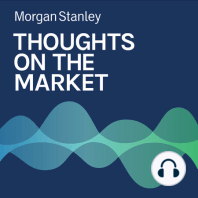3 min listen

Special Episode, Pt. 2: Inflation Around the World
Special Episode, Pt. 2: Inflation Around the World
ratings:
Length:
9 minutes
Released:
Feb 23, 2022
Format:
Podcast episode
Description
The challenges of inflation can be felt around the world, but understanding the regional differences is key to an effective 2022 for both central banks and investors.----- Transcript -----Andrew Sheets Welcome to Thoughts on the Market. I'm Andrew Sheets, Chief Cross Asset Strategist for Morgan Stanley Research.Seth Carpenter And I'm Seth Carpenter, Morgan Stanley's Chief Global Economist.Andrew Sheets And on part 2 of this special episode of Thoughts on the Market, we'll be continuing our discussion on central banks, inflation, and the outlook for markets. It's Tuesday, February 22nd at 1:00 p.m. in London.Seth Carpenter And 8:00 a.m. in New York.Andrew Sheets So Seth, you lay out the challenge that central banks face because they are being pulled in two directions. If they raise rates too quickly, the economy could slow too quickly. That means real people lose their jobs, real businesses have trouble getting loans. On the other hand, if they don't raise rates quickly enough, there's a risk that inflation would be higher and that has a real impact on the economy and people's lives. When it comes to, kind of, which side of caution to air on, how do you think central banks are thinking about that at the moment? And what would you be watching to indicate which side of that debate they're starting to come down on?Seth Carpenter I think if we're looking at the developed market, central banks, the Fed, the ECB, the Bank of England right now, I think they have a high conviction that the current stance of policy is just too accommodative given the state of the real economy and where inflation is. So I think right now all of them believe they need to get going, that starting now is fine. That mindset I don't think though will last too terribly long because over time we will start to see some outright tightening. So for the Fed, where does that point change? I think once they start to run off their balance sheet, probably sometime around the middle of this year, they're going to start to get much more cautious, they're going to look at markets and say how much of this tightening is being transmitted first through financial markets and then to the economy. So they'll be looking at credit spreads, they'll be looking at risk markets to ask, are we getting some traction? We think, especially if we're right and a bunch of the inflation that we're seeing now is this frictional inflation, that comes down in the latter half of the year. We think that hiking cycle is going to slow down over time. And so much like the Bank of England's forecast based on market pricing, we think there's probably a bit too much that's baked into markets in terms of how much hiking they do. They start off reasonably swiftly, knowing that they were too far away, knowing that they were being very accommodative. But in the latter half of the year, the pace of tightening starts to slow down.Andrew Sheets Seth, another question that I get quite a bit is at what point will market volatility cause the Fed or another central bank to change their policy? There's an idea in the market that if stocks drop or if credit spreads widen, or if there's higher volatility, then central banks would look at that and respond to that. From a central bank standpoint, how do you think central banks think about market volatility? And what are some important ways that you think investors either correctly or kind of incorrectly think about that reaction function?Seth Carpenter I can say over the 15 years that I spent at the Fed drafting policy documents, briefing the committee on policy options, thinking about how markets are affecting the economy, I can tell you the following. The market tends to have an overdeveloped sense of how sensitive central banks are to equity market reactions in particular. Equity market changes are important, it can be a very high frequency signal that there is cause to investigate what's going on in the economy. But they give many, many, many false signals as well
Released:
Feb 23, 2022
Format:
Podcast episode
Titles in the series (100)
Mike Wilson: Are U.S. Economic Indicators Flashing Yellow? by Thoughts on the Market